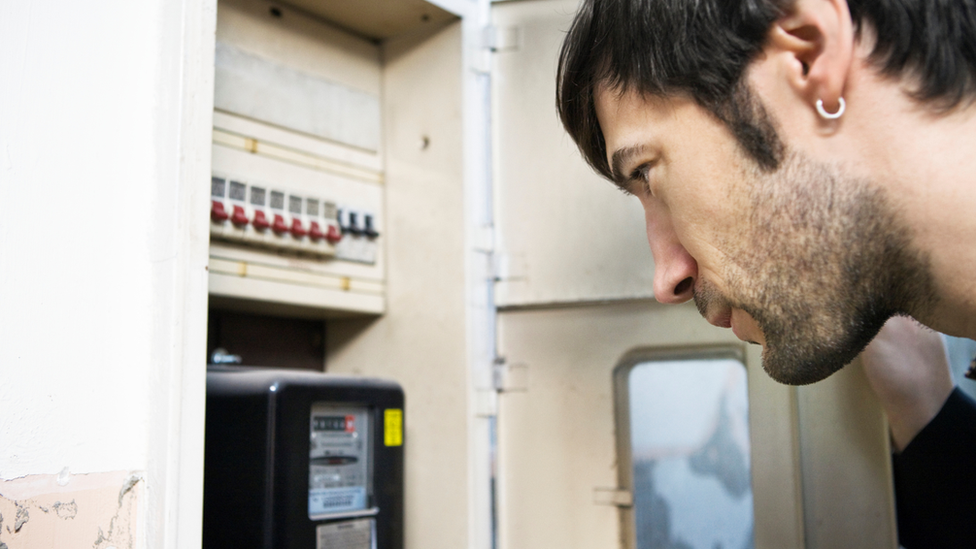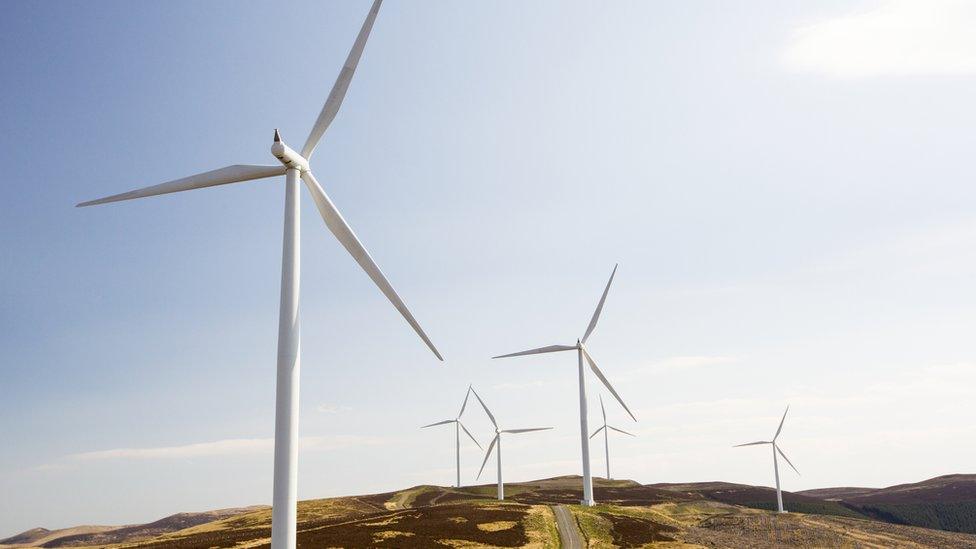Energy price cap: Typical energy bill set to rise by £800 a year in October
- Published

The typical household energy bill is set to rise by about £800 a year in October, the energy regulator warns.
Ofgem boss Jonathan Brearley said the energy price cap, which limits how much providers can raise prices, is expected to increase to £2,800 a year, due to continued volatility in gas prices.
Mr Brearley said the price rises were a "once in a generation event not seen since the oil crisis in the 1970s".
He added the number of households in fuel poverty may double to 12 million.
A household is in fuel poverty when it has to spend 10% or more of its disposable income on energy.
The energy price cap already rose sharply in April to £1,971, meaning that homes using a typical amount of gas and electricity are now paying an extra £700 per year on average.
Mr Brearley told the business select committee of MPs that Ofgem was only part way through reviewing prices ahead of setting the next cap in October, but added: "We are expecting a price cap in the region of £2,800."
It means the typical household bill could rise by £800 per year.

Ofgem's price cap covers England Wales and Scotland. Northern Ireland does not have a price cap, but households have also been witnessing sharp price rises.
Mr Brearley said that conditions in the global gas market had "worsened" following Russia's invasion of Ukraine, which has led to concerns about potential supply issues.
'Interrupted supplies'
He warned that the price cap could rise beyond £2,800 if Russia - one of the world's largest exporters of natural gas - decided to disrupt supplies.
"We are really managing between two versions of events," he said. "One where the price falls back down to where it was before, for example if there's peace in Ukraine, but one where prices could go even further if we were to see, for example, a disruptive interruption of gas from Russia."
Europe gets about 40% of its natural gas from Russia, so sudden supply cuts could have a huge economic impact.
While the UK would not be directly impacted by supply disruption as it imports less than 5% of its gas from Russia, it would be affected by prices rising on global markets as demand in Europe increased.
"The price changes we have seen in the gas market are genuinely a once-in-a-generation event not seen since the oil crisis of the 1970s," Mr Brearley told the Business select committee.
But the Ofgem boss apologised for regulatory shortcomings and admitted had financial controls been in place sooner for suppliers, fewer firms would have gone bust due to being unprepared for the sharp rise in wholesale prices.


We are all getting used to bill shocks when it comes to paying for gas and electricity - but this could be the biggest of all. Regulators do not usually give such early indications of the costs to come, which makes the seriousness of the situation all the more obvious.
Some 23 million households have their domestic energy bill governed by the price cap. In April, they typically started paying £700 a year more. In October, according to Mr Brearley, it could be a further annual rise of £800.
The trouble is, the old way of tackling this is as a billpayer was to shop around for a better tariff. That option is no longer available. Analysts say the average price of the cheapest 10 fixed tariffs on the market is £3,685 a year - clearly a poor financial choice.
So that leaves people to budget and use savings as best they can, and leaves ministers under even greater pressure to offer more support, especially during the colder, darker, more expensive months ahead.

Later on Tuesday, the Business Secretary Kwasi Kwarteng told MPs people will have to "wait and see what's forthcoming" from the chancellor and the prime minister on further help on energy bills as he said economic growth was the "time honoured way" to help people.
Mr Kwarteng said the government had put forward £9.1bn in support for energy bills, including council tax and energy bill rebates, and an extension of the Warm Home Discount. He added that the government had been waiting to see where gas prices were heading before making a decision on further assistance.
"What we see now isn't the full picture. Both the prime minister and the chancellor say there is more to do, and we have to see what is forthcoming", Mr Kwarteng told the committee.
'Wait and see?'
The Labour committee chairman, Darren Jones, asked the business secretary if he thought "bill payers are happy with that answer? Just wait and see?".
Mr Kwarteng acknowledged it was "a difficult time" and "people are under huge stress" but added that "nobody is suggesting that the government can pay the entirety of the energy bill".
"What we are committed to is giving support, and that's what we're doing," he said.

Asked by Mr Jones what he thought about the prospect of a one-off windfall tax on oil and gas companies, Mr Kwarteng said he didn't think it supported investment.
In response to Ofgem's price cap forecast, Downing Street acknowledged that energy prices were a "significant challenge", but said the government was "actively looking at what more could be done in this space".
Meanwhile, Labour's shadow chancellor Rachel Reeves questioned: "How many more alarm bells does the chancellor need to hear before he acts?
"The government have got to get a grip on this crisis and to protect families and our economy."
Ms Reeves repeated her party's call for a windfall tax on oil and gas firms' profits to help lower bills for households.
Recently, Shell reported a record £7bn profit in the first three months of this year while BP made £5bn, the highest for 10 years.


How have the energy price rises affected you and what will an increase in October do to your finances? Email: haveyoursay@bbc.co.uk, external.
Please include a contact number if you are willing to speak to a BBC journalist. You can also get in touch in the following ways:
WhatsApp: +44 7756 165803, external
Tweet: @BBC_HaveYourSay, external
Or fill out the form below
Please read our terms & conditions and privacy policy
If you are reading this page and can't see the form you will need to visit the mobile version of the BBC website to submit your question or comment or you can email us at HaveYourSay@bbc.co.uk, external. Please include your name, age and location with any submission.
Related topics
- Published24 May 2022

